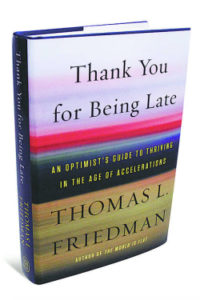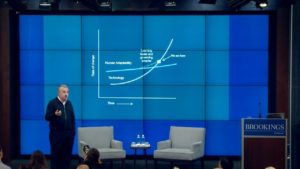 As a part of the Global Strategy course at the University of Maryland, we are encouraged to read and reflect on Thank You for Being Late by Thomas Friedman. Author of The World is Flat, Thomas Friedman explains how things have changed since the turn of the century and what caused this rapid change. He suggests that this great acceleration began in 2007 when initiatives such as the cloud and Hadoop allowed for the rapid gathering and analyzing of data. He points to various businesses that emerged in 2007 and that are now bringing rapid change. Friedman acknowledges that humans simply do not have the mental capacity to keep up with all of these changes. The title itself points to this fact; Friedman thanks one of his colleagues for being late because it allowed him time to think. Time to synthesize information and come to a conclusion on an issue that had been puzzling him for a while.
As a part of the Global Strategy course at the University of Maryland, we are encouraged to read and reflect on Thank You for Being Late by Thomas Friedman. Author of The World is Flat, Thomas Friedman explains how things have changed since the turn of the century and what caused this rapid change. He suggests that this great acceleration began in 2007 when initiatives such as the cloud and Hadoop allowed for the rapid gathering and analyzing of data. He points to various businesses that emerged in 2007 and that are now bringing rapid change. Friedman acknowledges that humans simply do not have the mental capacity to keep up with all of these changes. The title itself points to this fact; Friedman thanks one of his colleagues for being late because it allowed him time to think. Time to synthesize information and come to a conclusion on an issue that had been puzzling him for a while.
 Nonetheless, while we may never be able to keep up with the pace of change, Friedman urges us to try to stay ahead of the curve, at least in our field, through life-long learning. This is one of the main lessons that I will take away from this book. At the University of Maryland, I have had the opportunity to supplement my formal education with tutorials from Lynda.com. I figured that once I graduate and find a job, I will no longer have access to Lynda.com but it won’t matter because I will already have a job so I won’t need to use the tutorial site anyway. Friedman has rightfully pointed out that that is not the case. If I want to continue to be relevant to my employer and not to end up being replaced, I will have to engage in life-long learning and that there are plenty of platforms on which I can do this at little to no cost. Some of those platforms that I have looked into are udemy, coursera and YouTube. While YouTube is known for music, it is full of very useful knowledge that will set me apart in the workplace. Friedman explains that we should continue to learn in order to work smarter, not harder–or in his words, to “turn AI into IA.” This change in future perceptions was result of Friedman’s memorable statement that “average is officially over” (pg. 202). Along the same lines, Friedman’s 4 Cs are very important in today’s environment. I have witnessed this by watching family friends struggle to find jobs because they have not kept up with coding, assuming that it is irrelevant in their job market. I have taken note of this and have started independently learning coding languages such as python in order to make me stand out from the crowd and make me more employable.
Nonetheless, while we may never be able to keep up with the pace of change, Friedman urges us to try to stay ahead of the curve, at least in our field, through life-long learning. This is one of the main lessons that I will take away from this book. At the University of Maryland, I have had the opportunity to supplement my formal education with tutorials from Lynda.com. I figured that once I graduate and find a job, I will no longer have access to Lynda.com but it won’t matter because I will already have a job so I won’t need to use the tutorial site anyway. Friedman has rightfully pointed out that that is not the case. If I want to continue to be relevant to my employer and not to end up being replaced, I will have to engage in life-long learning and that there are plenty of platforms on which I can do this at little to no cost. Some of those platforms that I have looked into are udemy, coursera and YouTube. While YouTube is known for music, it is full of very useful knowledge that will set me apart in the workplace. Friedman explains that we should continue to learn in order to work smarter, not harder–or in his words, to “turn AI into IA.” This change in future perceptions was result of Friedman’s memorable statement that “average is officially over” (pg. 202). Along the same lines, Friedman’s 4 Cs are very important in today’s environment. I have witnessed this by watching family friends struggle to find jobs because they have not kept up with coding, assuming that it is irrelevant in their job market. I have taken note of this and have started independently learning coding languages such as python in order to make me stand out from the crowd and make me more employable.
Thomas Friedman uses this book to explain his view of the global state of affairs and where the world is headed. He explains the future in a rather optimistic way. While Friedman acknowledges that change will take time, I think that he is a little too optimistic. In my opinion, humans are too selfish to improve the world if it doesn’t directly involve them. Even though Friedman showed how a change in one part of the world has significant consequences (both good and bad) at the other end of the world, I think that that thinking may be too abstract for everyone who are simply living one day at a time. I want to believe in a world that Friedman is describing though and so I aim to do my part and lead by example. I have always believed in the power and the good that results from globalization. Yet, as a result of this book, I have discovered the precise reasons why globalization is a positive thing; it reduces costs through integration and the free movement of goods and people. It is only through collaboration that we will be able to solve the world’s toughest problems. If we continue to follow isolationist policies, fear of the “other” will be encouraged and increased costs will result due to physical and legal barriers. Furthermore, it is only when we all work together to take care of our environment that we will be able to sustain this planet as a hospitable living environment for the years to come. As a result of this book (and because I do not want to live in space), I know that I want to focus my life on promoting sustainability. With my marketing and international business degree, I am perfectly positioned to influence consumer behavior for the better.
To conclude, Thomas Friedman does a good job in describing the world as it is–even if those descriptions may be bleak at times–and then giving you advice on how you can excel in this environment and make it better. Definitely an interesting and light read intended to inspire.